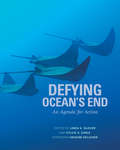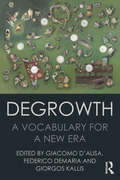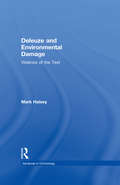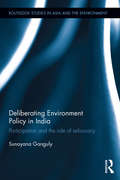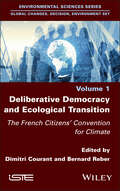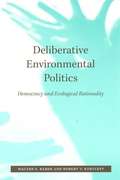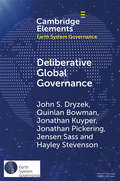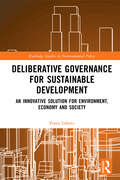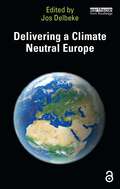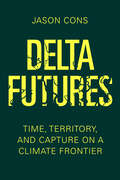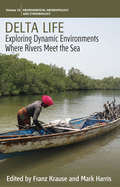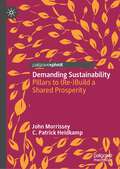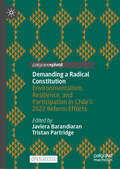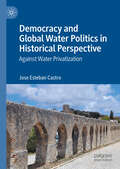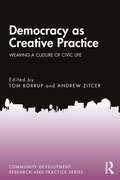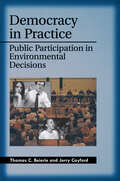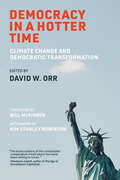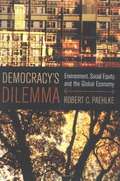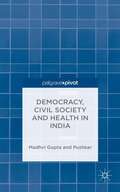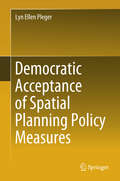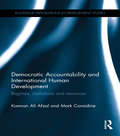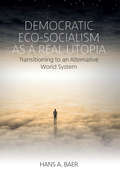- Table View
- List View
Defying Ocean's End: An Agenda For Action
by Sylvia Earle Linda Glover Graeme KelleherIf humankind were given a mandate to do everything in our power to undermine the earth's functioning, we could hardly do a better job than we have in the past thirty years on the world's oceans, both by what we are putting into it-millions of tons of trash and toxic materials-and by what we are taking out of it-millions of tons of wildlife. Yet only recently have we begun to understand the scale of those impacts. Defying Ocean's End is the result of an unprecedented effort among the world's largest environmental organizations, scientists, the business community, media, and international governments to address these marine issues. In June 2003, in the culmination of a year-long effort, they met specifically to develop a comprehensive and achievable agenda to reverse the decline in health of the world's oceans. As conservation organizations begin to expand their focus from land issues to include a major focus on preservation of the sea, it is increasingly apparent that we have to approach marine conservation differently and at much larger scale than we have to date. What's also clear is the magnitude and immediacy of the growing ocean concerns are such that no one organization can handle the job alone. Defying Ocean's End is a bold step in bringing the resources needed to bear on this vast problem before it is too late. It offers a broad strategy, a practical plan with priorities and costs, aimed at mobilizing the forces needed to bring about a "sea change" of favorable attitudes, actions, and outcomes for the oceans-and for all of us.
Degrowth: A Vocabulary for a New Era (The\economy: Key Ideas Ser.)
by Giacomo D'Alisa Federico Demaria Giorgos KallisDegrowth is a rejection of the illusion of growth and a call to repoliticize the public debate colonized by the idiom of economism. It is a project advocating the democratically-led shrinking of production and consumption with the aim of achieving social justice and ecological sustainability. This overview of degrowth offers a comprehensive coverage of the main topics and major challenges of degrowth in a succinct, simple and accessible manner. In addition, it offers a set of keywords useful forintervening in current political debates and for bringing about concrete degrowth-inspired proposals at different levels - local, national and global. The result is the most comprehensive coverage of the topic of degrowth in English and serves as the definitive international reference. More information at: vocabulary.degrowth.org View the author spotlight featuring events and press related to degrowth at http://t.co/k9qbQpyuYp.
Delamination in Wood, Wood Products and Wood-Based Composites
by Voichita BucurIn the last quarter century, delamination has come to mean more than just a failure in adhesion between layers of bonded composite plies that might affect their load-bearing capacity. Ever-increasing computer power has meant that we can now detect and analyze delamination between, for example, cell walls in solid wood. This fast-moving and critically important field of study is covered in a book that provides everyone from manufacturers to research scientists the state of the art in wood delamination studies. Divided into three sections, the book first details the general aspects of the subject, from basic information including terminology, to the theoretical basis for the evaluation of delamination. A settled terminology in this subject area is a first key goal of the book, as the terms which describe delamination in wood and wood-based composites are numerous and often confusing. The second section examines different and highly specialized methods for delamination detection such as confocal laser scanning microscopy, light microscopy, scanning electron microscopy and ultrasonics. Ways in which NDE (non-destructive evaluation) can be employed to detect and locate defects are also covered. The book's final section focuses on the practical aspects of this defect in a wide range of wood products covering the spectrum from trees, logs, laminated panels and glued laminated timbers to parquet floors. Intended as a primary reference, this book covers everything from the microscopic, anatomical level of delamination within solid wood sections to an examination of the interface of wood and its surface coatings. It provides readers with the perspective of industry as well as laboratory and is thus a highly practical sourcebook for wood engineers working in manufacturing as well as a comprehensively referenced text for materials scientists wrestling with the theory underlying the subject.
Delaware Water Gap National Recreation Area (Images of America)
by Laura ObisoEuropeans first settled in what was to become the Delaware Water Gap National Recreation Area (DWGNRA) in the 17th century. By the late 1800s, the Delaware Water Gap had become a popular vacation spot, attracting thousands to the palatial resorts in the mountains. Rural communities thrived in the valley until the 1960s. The DWGNRA was created in 1965 to oversee activities centered around a reservoir that was to be the result of a dam to be built on the Delaware River at Tocks Island. In anticipation of the dam, the government removed residents by purchasing or condemning property. An environmental and political war raged, and the dam was ultimately defeated. Although several historical sites were lost, many survived and a few have been restored. Today the DWGNRA is one of the country's most popular parks. Within its boundaries are rugged and beautiful wilderness, historic landmarks, and the wild and scenic Delaware River.
Deleuze and Environmental Damage: Violence of the Text (New Advances in Crime and Social Harm)
by Mark HalseyThis book offers a post-structuralist critique of the problems associated with modernist accounts of environmental harm and regulation. Through a notably detailed micro-political analysis of forest conflict, the author explores the limits of academic commentary on environmental issues and suggests that the traditional variables of political economy, race and gender need to be recast in light of four key modalities through which 'the environment' and 'environmental damage' are (re)produced. Focusing on vision, speed, lexicon and affect, the book engages a new ethic for categorizing and regulating 'nature' and challenges criminologists, sociologists, cultural theorists and others to reconsider what it is possible to say and do about environmental problems.
Deliberating Environmental Policy in India: Participation and the Role of Advocacy (Routledge Studies in Asia and the Environment)
by Sunayana GangulyAs one of the world’s largest and most bio-diverse countries, India’s approach to environmental policy will be very significant in tackling global environmental challenges. This book explores the transformations that have taken place in the making of environmental policy in India since the economic liberalization of the 1990s. It investigates if there has been a slow shift from top-down planning to increasingly bottom up and participatory policy processes, examining the successes and failures of recent environmental policies. Linking deliberation to collective action, this book contends that it is crucial to involve local actors in framing the policies that decide on their rights and control over bio-resources in order to achieve the goal of sustainable human development. The first examples of large-scale participatory processes in Indian environmental policy were the 1999 National Biodiversity Strategy Action Plan and the 2006 Scheduled Tribes and Other Traditional Forest Dwellers Act. This book explores these landmark policies, exploring the strategies of advocacy and deliberation that led to both the successes and failures of recent initiatives. It concludes that in order to deliberate with the state, civil society actors must engage in forms of strategic advocacy with the power to push agendas that challenge mainstream development discourses. The lessons learnt from the Indian experience will not only have immediate significance for the future of policy making in India, but they will also be of interest for other countries faced with the challenges of integrating livelihood and sustainability concerns into the governance process.
Deliberative Democracy and Ecological Transition: The French Citizens' Convention for Climate (ISTE Invoiced)
by Bernard Reber Dimitri CourantDemocracies are struggling to respond to the climate crisis. One promising approach to the ecological transition is based on innovations involving panels of citizens drawn at random. Many countries have experimented with this form of deliberative democracy at national and local levels. These citizens’ assemblies formulate public policy proposals. The French Citizens' Convention for Climate is the largest in terms of size, duration and mandate. Thanks to a multi-disciplinary field survey involving around twenty researchers, this book provides an understanding of the complexity of this experience from several angles: procedures and processes; the identity and roles of its members; relationships with expertise and representatives; evaluation and comparison with other cases. Deliberative Democracy and Ecological Transition plays an important role in reflecting on an original practice of democratic innovation and its potential for fair governance of climate policies.
Deliberative Environmental Politics: Democracy and Ecological Rationality
by Walter F. Baber Robert V. BartlettIn Deliberative Environmental Politics, Walter Baber and Robert Bartlett link political theory with the practice of environmental politics, arguing that the "deliberative turn" in democratic theory presents an opportunity to move beyond the policy stalemates of interest group liberalism and offers a foundation for reconciling rationality, strong democracy, and demanding environmentalism. Deliberative democracy, which presumes that the essence of democracy is deliberation -- thoughtful and discursive public participation in decision making -- rather than voting, interest aggregation, or rights, has the potential to produce more environmentally sound policy decisions and a more ecologically rational form of environmental governance. Baber and Bartlett defend deliberative democracy's relevance to environmental politics in the twenty-first century against criticisms from other theorists. They critically examine three major models for deliberative democracy -- those of John Rawls, Jurgen Habermas, and advocates of full liberalism such as Amy Gutman, Dennis Thompson, and James Bohman -- and analyze the implications of each of these approaches for ecologically rational environmental politics as well as for institutions, citizens, experts, and social movements. In order to establish that democracy is ecologically sustainable and that environmental protection can (and must) become a norm of culture rather than a mere fact of government, they argue, new models of ecological deliberation and deliberative environmentalism are required.
Deliberative Global Governance (Elements in Earth System Governance)
by Hayley Stevenson John S. Dryzek Quinlan Bowman Jonathan Kuyper Jonathan Pickering Jensen SassGlobal institutions are afflicted by severe democratic deficits, while many of the major problems facing the world remain intractable. Against this backdrop, we develop a deliberative approach that puts effective, inclusive, and transformative communication at the heart of global governance. Multilateral negotiations, international organizations and regimes, governance networks, and scientific assessments can be rendered more deliberative and democratic. More thoroughgoing transformations could involve citizens' assemblies, nested forums, transnational mini-publics, crowdsourcing, and a global dissent channel. The deliberative role of global civil society is vital. We show how different institutional and civil society elements can be linked to good effect in a global deliberative system. The capacity of deliberative institutions to revise their own structures and processes means that deliberative global governance is not just a framework but also a reconstructive learning process. A deliberative approach can advance democratic legitimacy and yield progress on global problems such as climate change, violent conflict and poverty.
Deliberative Governance for Sustainable Development: An Innovative Solution for Environment, Economy and Society (Routledge Studies in Environmental Policy)
by Franz LehnerDeliberative Governance for Sustainable Development argues that governance has become the core problem of sustainable development and identifies deliberative democracy and governance as a path forward for Western societies. In this book the author puts forward three messages. Firstly, while sustainable development theoretically is a common good of all people, it is in practice constantly associated with a multitude of smaller and larger conflicts. These conflicts arise repeatedly because, in practice, the benefits, costs and risks of sustainable development are unequally distributed and therefore form a massive barrier to sustainable development. As a result, sustainable development depends on the ability of the social and political institutions of societies to accommodate these conflicts. Second, within the framework of their established institutional structures, Western societies do not have the sufficient tools for conflict resolution that are adequate to the conditions of modern diversified societies and the complex challenges of sustainable development. They need to implement institutional reforms that switch institutional structures towards deliberation. Third, by switching to deliberation, Western societies can reach the high level of governance that enables them to achieve environmentally sustainable development that will bring them significant economic and social benefits and, as a result, may reach far beyond their borders. This volume offers a novel, transdisciplinary approach to sustainable development and governance in Western societies. It will be of great interest to students and scholars of sociology, economics, politics, environmental studies and philosophy, as well as professionals and policymakers working in the area of sustainable development.
Delivering a Climate Neutral Europe
by Jos DelbekeDelivering a Climate Neutral Europe summarises the achievements of 25 years of EU Climate Policy, with the emphasis on what has been achieved under the Green Deal. It also highlights climate issues on the table of policy makers in the next European policy cycle 2024–2029.Curated by Jos Delbeke, one of the foremost experts in this field, the chapters are all written by responsible officials of the EU Commission services, who were deeply involved in the negotiations related to the legislation they prepared. They explain how ambitious targets were prepared for 2030 and 2050 in view of implementing the commitments taken in 2015 under the Paris Agreement and present the overall architecture of the policy to counter the idea that an avalanche of legislative action is being developed without much structure. In particular, this book examines the carbon pricing tool that Europe implemented under the EU Emissions Trading System (EU ETS), the differentiated targets Member States have to deliver and climate-relevant EU legislation in the fields of energy, transport, industry, finance and agriculture and forestry. The authors also discuss the upcoming headwinds in the form of a growing scepticism in public opinion, and the impact of the wars in the close neighbourhood of the European continent.Written as a follow-up to previous publications EU Climate Policy Explained and Towards a Climate-Neutral Europe, this new volume will be a vital resource for students, scholars and policy makers alike who are researching and working in the areas of climate change, environmental governance and EU policy more broadly.
Delta Futures: Time, Territory, and Capture on a Climate Frontier
by Jason ConsA free ebook version of this title is available through Luminos, University of California Press's Open Access publishing program. Visit www.luminosoa.org to learn more.Delta Futures explores the competing visions of the future that are crowding into the Bengal Delta's imperiled present and vying for control of its ecologically vulnerable terrain. In Bangladesh's southwest, development programs that imagine the delta as a security threat unfold on the same ground as initiatives that frame the delta as a conservation zone and as projects that see the delta's rivers and ports as engines for industrial growth. Jason Cons explores how these competing futures are being brought to life: how they are experienced, understood, and contested by those who live and work in the delta, and the often surprising entanglements they engender—between dredgers and embankments, tigers and tiger prawns, fishermen and forest bandits, and more. These future visions produce the delta as a "climate frontier," a zone where opportunity, expropriation, and risk in the present are increasingly framed in relation to disparate visions of the delta's climate-affected future.
Delta Life: Exploring Dynamic Environments where Rivers Meet the Sea (Environmental Anthropology and Ethnobiology #28)
by Franz Krause and Mark HarrisProposing a series of innovative steps towards better understanding human lives at the interstices of water and land, this volume includes eight ethnographies from deltas around the world. The book presents ‘delta life’ with intimate descriptions of the predicaments, imaginations and activities of delta inhabitants. Conceptually, the collection develops ‘delta life’ as a metaphor for approaching continual and intersecting sociocultural, economic and material transformations more widely. The book revolves around questions of hydrosociality, volatility, rhythms and scale. It thereby yields insights into people’s lives that conventional, hydrological approaches to deltas cannot provide.
Demanding Energy: Space, Time and Change
by Gordon Walker Allison Hui Rosie DayThis edited collection critically engages with an important but rarely-asked question: what is energy for? This starting point foregrounds the diverse social processes implicated in the making of energy demand and how these change over time to shape the past patterns, present dynamics and future trajectories of energy use. Through a series of innovative case studies, the book explores how energy demand is embedded in shared practices and activities within society, such as going to music festivals, cooking food, travelling for business or leisure and working in hospitals. Demanding Energy investigates the dynamics of energy demand in organisations and everyday life, and demonstrates how an understanding of spatiality and temporality is crucial for grasping the relationship between energy demand and everyday practices. This collection will be of interest to researchers and students in the fields of energy, climate change, transport, sustainability and sociologies and geographies of consumption and environment. Chapters 1 and 15 of this book are available open access under a CC BY 4.0 license at link.springer.com
Demanding Sustainability: Pillars to (Re-)Build a Shared Prosperity
by John Morrissey C. Patrick HeidkampLonger term thinking and new approaches to development and prosperity have never been more urgently required. Since 2020, the precarity of the global economy, links between ecological destruction and public health and disparities in levels of exposure and vulnerability to systemic disruption have all been thrown into stark relief. In this book the authors put forward a series of principles on which economic and development policy for the post-Covid era should be developed. These are outlined as five 'pillars' through which to (re-)build a shared prosperity in the aftermath of the Covid-19 global shock. The five pillars are an ecological prosperity (pillar one), a decarbonized economy (pillar two), a shared (cost) burden (pillar three), a transformative social sustainability (pillar four) and a just resilience (pillar five). The book provides a framework through which policymakers, decision-makers, politicians, community groups and the corporate sphere might begin to consider, map out, and plan for just transitions in their domains.
Demanding a Radical Constitution: Environmentalism, Resilience, and Participation in Chile’s 2022 Reform Efforts
by Javiera Barandiaran Tristan PartridgeThis open access book documents the critical thinking and political actions that generated one of the world’s most progressive national constitutions, presented to the Chilean public in 2022. Although that text was ultimately rejected in a national referendum, it drew on decades of diverse environmental, political, Indigenous, and community organizing and contained concepts and goals at the forefront of global efforts to create more just and equitable political systems, healthier living environments, and more resilient ecosystems. Drawing on research by faculty and students from the USA and Chile, chapters within this book address political memory, Indigenous representation, public participation, the Rights of Nature, environmental law, mining conflicts, natural commons, knowledge systems, and rural education. This book highlights important contributions from Chile’s 2022 reform efforts for diverse global responses to the erosion of democracy, environmental degradation, and climate change.
Democracy and Global Water Politics in Historical Perspective: Against Water Privatization
by Jose Esteban CastroThis book addresses water privatization from a historical-sociological perspective and argues against the unrelenting imposition of neoprivatist water politics worldwide. Water is essential for life, but it is also a source of economic and political power. Prevailing water politics continues to erode the conditions of dignified living conditions of millions of human beings around the world, including many living in Western capitalist democracies. The book revisits water-related myths, fake truths, and authoritarian practices promoted or employed by International Financial Institutions, governments, and other powerful actors to keep enforcing long-failed policies grounded on ideological dogmas and short-term interests and argues for the substantive democratization of water politics and management. It rejects claims of scientific ‘neutrality’ from academics and other actors across the political spectrum who are co-responsible for the perpetuation of these conditions, interrogating the ethics of scientific-political pragmatism.
Democracy as Creative Practice: Weaving a Culture of Civic Life (ISSN)
by Tom Borrup Andrew ZitcerDemocracy as Creative Practice: Weaving a Culture of Civic Life offers arts-based solutions to the threats to democracies around the world, practices that can foster more just and equitable societies. Chapter authors are artists, activists, curators, and teachers applying creative and cultural practices in deliberate efforts to build democratic ways of working and interacting in their communities in a range of countries including the United States, Australia, Portugal, Nepal, the United Kingdom, and Canada. The book demonstrates how creativity is integrated in place-based actions, aesthetic strategies, learning environments, and civic processes. As long-time champions and observers of community-based creative and cultural practices, editors Tom Borrup and Andrew Zitcer elucidate work that not only responds to sociopolitical conditions but advances practice. They call on artists, funders, cultural organizations, community groups, educational institutions, government, and others to engage in and support this work that fosters a culture of democracy.This book is intended for undergraduate and graduate students in the humanities and social sciences, activists, funders, and artists who seek to understand and effect change on local and global scales to preserve, extend, and improve practices of democracy.
Democracy in Practice: Public Participation in Environmental Decisions
by Thomas C. BeierleIn spite of the expanding role of public participation in environmental decisionmaking, there has been little systematic examination of whether it has, to date, contributed toward better environmental management. Neither have there been extensive empirical studies to examine how participation processes can be made more effective. Democracy in Practice brings together, for the first time, the collected experience of 30 years of public involvement in environmental decisionmaking. Using data from 239 cases, the authors evaluate the success of public participation and the contextual and procedural factors that lead to it. Thomas Beierle and Jerry Cayford demonstrate that public participation has not only improved environmental policy, but it has also played an important educational role and has helped resolve the conflict and mistrust that often plague environmental issues. Among the authors' findings are that intensive 'problem-solving' processes are most effective for achieving a broad set of social goals, and participant motivation and agency responsiveness are key factors for success. Democracy in Practice will be useful for a broad range of interests. For researchers, it assembles the most comprehensive data set on the practice of public participation, and presents a systematic typology and evaluation framework. For policymakers, political leaders, and citizens, it provides concrete advice about what to expect from public participation, and how it can be made more effective. Democracy in Practice concludes with a systematic guide for use by government agencies in their efforts to design successful public participation efforts.
Democracy in a Hotter Time: Climate Change and Democratic Transformation
by Kim Stanley RobinsonThe first major book to deal with the dual crises of democracy and climate change as one interrelated threat to the human future and to identify a path forward.Democracy in a Hotter Time calls for reforming democratic institutions as a prerequisite for avoiding climate chaos and adapting governance to how Earth works as a physical system. To survive in the &“long emergency&” ahead, we must reform and strengthen democratic institutions, making them assets rather than liabilities. Edited by David W. Orr, this vital collection of essays proposes a new political order that will not only help humanity survive but also enable us to thrive in the transition to a post–fossil fuel world.Orr gathers leading scholars, public intellectuals, and political leaders to address the many problems confronting our current political systems. Few other books have taken a systems view of the effects of a rapidly destabilizing climate on our laws and governance or offered such a diversity of solutions. These thoughtful and incisive essays cover subjects from Constitutional reform to participatory urban design to education; together, they aim to invigorate the conversation about the human future in practical ways that will improve the effectiveness of democratic institutions and lay the foundation for a more durable and just democracy.ContributorsWilliam J. Barber III, JD, William S. Becker, Holly Jean Buck, Stan Cox, Michael M. Crow, William B. Dabars, Ann Florini, David H. Guston, Katrina Kuh, Gordon LaForge, Hélène Landemore, Frances Moore Lappé, Daniel Lindvall, Richard Louv, James R. May, Frederick W. Mayer, Bill McKibben, Michael Oppenheimer, David W. Orr, Wellington Reiter, Kim Stanley Robinson, Anne-Marie Slaughter
Democracy's Dilemma: Environment, Social Equity, And The Global Economy
by Robert C. PaehlkeThe author calls for a balancing of economic, environmental, and social concerns in the age of global economic integration.
Democracy, Civil Society, and Health in India
by Madhvi Gupta PushkarIndia's health failures remain visible and pronounced despite high rates of economic growth since the 1980s and more than six decades of democratic rule. The authors address the key issues that emerge from the country's health situation, speculating on what it will take for low-income groups to begin claiming for better social services
Democratic Acceptance of Spatial Planning Policy Measures
by Lyn Ellen PlegerThis book examines the democratic acceptance of spatial planning measures, using Switzerland as a case study. The currently inefficient land use in industrialised countries calls for new spatial planning policies. Yet governments have largely failed to implement innovative policy measures, which may be due to a lack of democratic acceptance. To date, little is known about the democratic acceptance of spatial planning measures. Switzerland offers a promising candidate because of its direct-democratic system, which allows citizens’ preferences for specific policy measures to be directly measured. In this work, the democratic acceptance of spatial planning instruments is investigated from various perspectives in the form of original empirical studies, which are embedded in an innovative conceptual framework. It demonstrates that not only spatial planning instruments in general, but also incentive-based instruments in particular, generally enjoy high acceptance. This finding is remarkable, considering the fact that efficient land use instruments have only been marginally implemented. Addressing the needs of both academics and land use practitioners in the private and public sector, the book shows that in order to improve the democratic acceptance of spatial planning measures, attention must be paid to their context, content and the means by which that content is provided.
Democratic Accountability and International Human Development: Regimes, institutions and resources (Routledge Explorations in Development Studies)
by Kamran Ali Afzal Mark ConsidineScholars and policymakers have long known that there is a strong link between human development and spending on key areas such as education and health. However, many states still neglect these considerations in favour of competing priorities, such as expanding their armies. This book examines how states arrive at these decisions, analysing how democratic accountability influences public spending and impacts on human development. The book shows how the broader paradigm of democratic accountability – extending beyond political democracy to also include bureaucratic and judicial institutions as well as taxation and other modes of resource mobilisation – can best explain how states allocate public resources for human development. Combining cross-country regression analysis with exemplary case studies from Pakistan, India, Botswana and Argentina, the book demonstrates that enhancing human capabilities requires not only effective party competition and fair elections, but also a particular nesting of public organisational structures that are tied to taxpaying citizens in an undisturbed chain of accountability. It draws out vital lessons for institutional design and our approach to the question of human development, particularly in the less developed states. This book will be of great interest to postgraduate students and researchers in the fields of political economy, public policy, governance, and development. It also provides valuable insights for those working in the international relations field, including inside major aid and investment organisations.
Democratic Eco-Socialism as a Real Utopia: Transitioning to an Alternative World System
by Hans A. BaerAs global economic and population growth continues to skyrocket, increasingly strained resources have made one thing clear: the desperate need for an alternative to capitalism. In Democratic Eco-Socialism as a Real Utopia, Hans Baer outlines the urgent need to reevaluate historical definitions of socialism, commit to social equality and justice, and prioritize environmental sustainability. Democatic eco-socialism, as he terms it, is a system capable of mobilizing people around the world, albeit in different ways, to prevent on-going human socio-economic and environmental degradation, and anthropogenic climate change.
